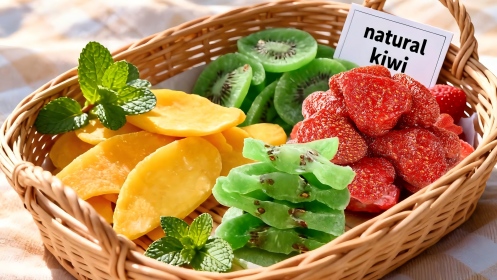A Shopper's Guide to Premium Dried Strawberries
Dried strawberries have become a pantry staple for health-conscious snackers, bakers, and busy parents. But with countless brands filling store shelves and online listings, how do you separate the real deal strawberry?
Don't worry! This simple guide will show you how to select the best quality dried strawberries and apply the same techniques to other dried fruits you love, such as dried kiwi, dried apple, dried mango, and more.What to Look For On the Label

The ingredient list and nutrition label are your best friends.Here's is your cheat sheet:
1. The Ingredient List: Keep it Short & Sweet (Naturally!)
This is the golden rule. The best dried fruits have only one ingredient: the fruit itself.
· What you want to see: Ingredients: Strawberries.
· What you might see: Ingredients: Strawberries, Cane Sugar, Sunflower Oil, Natural Flavors, Sulfur Dioxide (Preservative).
While additives like a tiny bit of oil (to prevent sticking) or citric acid (for tartness) are common, the goal is to find the product with the shortest, most natural list. The fruit should be sweet enough on its own!
2. The Sugar Sneak: Avoid "Added Sugars"
Fruits are naturally high in sugar, which becomes concentrated when dried. There is absolutely no need for extra sugar. If you see "cane sugar," "corn syrup," or "fruit juice concentrate" high on the list, you're essentially buying candy.
Pro Tip: Check the "Added Sugars" line on the nutrition facts panel. Aim for0g Added Sugar.
3. The Preservative Puzzle: To Sulfur or Not to Sulfur?
You might see "Sulfured" or "Sulfur Dioxide" on some dried fruits, especially bright-colored ones like dried apples, apricots, and peaches.
· What it does: Sulfur dioxide preserves the fruit's vibrant color and extends shelf life. Without it, fruit naturally darkens.
· The Choice: Sulfured fruit is brighter and softer. Unsulfured(or "Unsulphured") fruit is darker, often browner, and can have a more robust, caramelized flavor. Many people prefer to avoid sulfites, especially if they have sensitivities, so unsulfured is a great, natural choice.
A Quick Guide to Other Popular Dried Fruits
Now that you know the basics, let's apply them to your other fruity favorites:
· Dried Kiwi: This one is a sugar trap! Many dried kiwi products are heavily sweetened to balance its natural tartness. Be extra vigilant about checking for added sugars. The best dried kiwi will be a muted green color and pleasantly chewy, not sticky-sweet.
· Dried Apple Slice: A classic! Look forunsulfuredapple rings for a more natural, caramel-apple flavor. They should be leathery and chewy, not crispy (those are freeze-dried or fried). Cinnamon-dusted apples can be a nice treat, but check that sugar isn't the main ingredient.
· Dried Mango: This is a big one. Avoid "candied" mango that's bright orange and swimming in sugar syrup. The best dried mango isunsweetenedand has a deep, orange-brown color. It should be pliable and taste purely of mango.
· Dried Pineapple: Similar to mango, the best dried pineapple is unsweetened and unsulfured. It will be a darker yellow or brownish color and have an intense, tropical flavor.
· Dried Cranberries: Let's be honest—almost all dried cranberries are sweetened because they are naturally very tart. It's hard to find unsweetened versions, but you can still choose brands with less added sugar or those sweetened with a smaller amount of fruit juice.
Your At-a-Glance Checklist
Before you toss that bag in your cart, do a quick scan:
✅Ingredients: Does it list only the fruit? (Or very close to it?)
✅Added Sugar: Does the nutrition label show 0g?
✅Color: Is the color natural, or artificially bright? (Hint: Think brownish for unsulfured).
✅Texture: Does it look moist and chewy, or hard and crystallized?
Final Snack Tip
Buying good dried fruit is an investment in your health and your taste buds. By choosing options with no added sugar and minimal ingredients, you’re getting the pure, delicious essence of the fruit.
Happy (and smart) snacking
Get Quote
